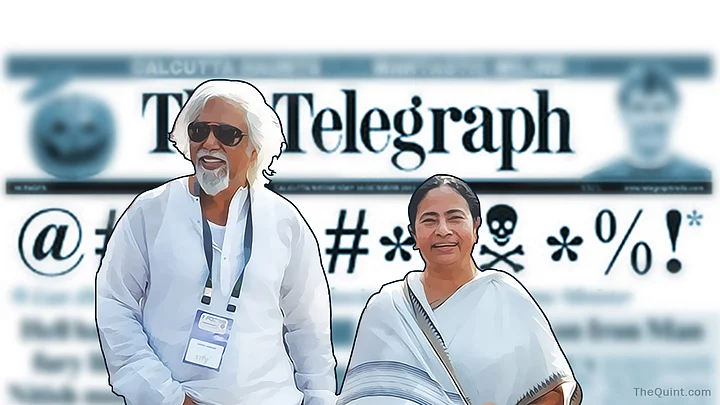Almost every evening after the edit meeting that he would chair in his elegant and tastefully-designed third floor office chamber, Aveek Sarkar would take the lift down to The Telegraph’s first floor newsroom. Flashing a toothy smile, he would walk across to the deputy editor’s seat, fidget with his half-moon eyeglasses, clutch the frilly frontal pleats of the crisp dhooti and with his right hand fingers scratch his goatee as he discussed the finer elements of the day’s big story.
Silence would envelope the otherwise raucous, white-walled newsroom as Sarkar would hunch over at the deputy editor’s table and confer on how the lead story would be splashed across Page 1. On some occasions he would amble across to the reporters’ alley, nod at a few senior reporters, have a quick word with the bureau chief or chief reporter and walk away briskly, his shock of silvery hair matching the sparkling white, starched dhooti-and-panjabi worn in the fashion of an erudite 19th century Bengali bhadralok.
Many young journalists in TT’s newsroom would hold their breath, fearing his legs would tangle in the mass of the dhooti’s pleats and he would stumble. Not surprisingly, he managed his dhooti and The Telegraph with dexterous ease. Until June 22, 2016. When word came through last evening that Aveek babu had resigned as The Telegraph and its powerful and imposing sister publication Anandabazar Patrika’s editor-in-chief, my first reaction was one of utter disbelief.

The Campaign Against Didi
His resignation, stunning news in itself, sent shockwaves across much of Kolkata, especially within the imposing ABP headquarters on Prafulla Sarkar Street, named after the Bengali media moghul’s grandfather who had played a seminal role in the nationalist movement of the 1940s. After being at the helm of the ABP Group for 33 years, Sarkar had finally stumbled, not on the flowing pleats of his dhooti, but in the wake of a high-octane coverage of a rancorous Bengal election campaign.
Sarkar had invested all his energy into the election coverage, making the Trinamool Congress in general and its fiery leader and chief minister Mamata Banerjee The Telegraph, and especially the Anandabazar Patrika’s, principal targets.
Sarkar’s campaign, which began several months before Bengal went to the hustings, was relentless. There was not a day in the months leading to the election when The Telegraph and ABP would not go to town with hard-hitting stories against the TMC and its leadership. Eight-column headlines were common.
The tone and the tenor of the stories left nothing to the imagination: the ABP Group wanted the Mamata government to go. An uncompromising Sarkar had driven himself to believe that the Left-Congress coalition would inflict a crushing defeat on the Trinamool whose government, in its first term in office, had become the epitome of corruption, moral depravity and misrule.
The results, of course, threw up a huge surprise, stunning Sarkar and leaving him deflated, dejected and spent.
Assessing Left’s Downfall
Sarkar’s visceral dislike for Mamata and her lumpen followers was in stark contrast to the overwhelming reverence displayed by each of his group units – print and electronic – which saw in the TMC leader the dawn of a new era in Bengal politics when her party crushed the seemingly unbeatable CPI(M)-led Left Front. In a gushing front page article, The Telegraph described the TMC’s 2011 victory as “historic thunder”, likening the CPM’s defeat to the fall of the Berlin Wall.
At that time Sarkar and his journalist colleagues in The Telegraph and ABP correctly assessed the downfall of the Left in Bengal. It was easy. The moment was politically ripe for the CPM’s exit: the people were fed up with the party and its thugs, economic advancement had ground to a halt a long time ago, Calcutta (as it was then known) was in its death throes. Bengal was sick and it needed a strong dose of antibiotic, if not surgery, if it was to be restored to good health.

Loss of Objectivity
Meanwhile, Aveek babu grew younger. The long mane that he began sporting gave him the appearance of a rockstar owner-editor. As Mamata blundered and a muscular BJP led by Narendra Modi demolished the Congress at the Centre, Sarkar opened two fronts – one against a force which was set to take Bengal down and the other against the Modi-led BJP for whom he had an intense aversion. A strange obsession had taken hold of Sarkar. And obsession gave way to loss of objectivity, the bedrock of journalism.
Great anti-establishment stories, however, do not always make for sound family business. As stories in The Telegraph and ABP became more and more caustic, little did he realise that revenues were taking a hit. State government advertisements had begun drying up, leaving Aveek babu’s younger brother Arup, who holds majority stake, in a quandary.
Beyond the Resignation
We will never know what really occasioned
Sarkar’s resignation – pressure from his younger sibling that the group’s financial
ship needed steadying and therefore needless needling of the state government
must cease or a vindictive Mamata, wounded by the barrage of stories against
her and her party, breathing down his neck.
We may miss his name in The Telegraph and ABP’s printline, but be sure that Aveek Sarkar will continue to play a role in matters editorial with the newly-designed twin roles of group vice-chairman and editor emeritus, whatever that means.
Also read:
After Victory, Mamata Forgets Regret Over ‘Narada News’ Sting
In Bengal Today, Mamata Banerjee Represents the Bawdy Politic
(At The Quint, we question everything. Play an active role in shaping our journalism by becoming a member today.)
